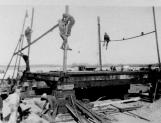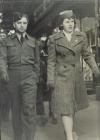1
Thar she blows. A blast of dirt from a seismic test shot near Redwater.Circa 1947
Redwater, Alberta, Canada
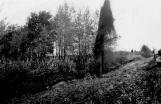
2
"Thar She Blows". The quest for oil was on! Seismograph crews came into the Redwater area in 1947 and early 1948. This was hot on the heels of the Leduc oil discovery. Excitement was beginning to build as local town's people speculated on the likelihood of oil being discovered.3
Fin Lineham with his pet dog Teddy in the Imperial Oil truck at Redwater, Alberta,Circa 1948
Redwater, Alberta, Canada
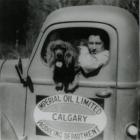
4
On July 2, 1948 a wildcat crew headed by Fin Lineham began moving onto the Hilton Cook farm. A campsite of sleeping shacks were set up on the edge of town to accommodate the men. The massive drilling rig had to be assembled bolt by bolt and it wasn't until July 23, 1948 when the crew actually began drilling Imperial Esso # 1. On August 30, 1948 Imperial Esso #1, The Discovery Well, struck oil and a massive oil boom was about to begin.6
The Discovery Well on the Cook family farm during harvest 1948Circa 1948
Redwater, Alberta, Canada
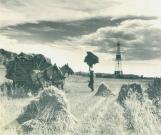 Credits:
Credits:Imperial Oil Review October-November 1948 Vol. 32 No. 5
Imperial Oil Fonds, Glenbow Archives, Calgary, Alberta.
7
Jim and Ann Evasiw handing out mail to waiting customers.Circa 1948
Redwater, Alberta, Canada
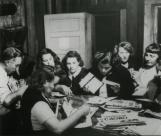 Credits:
Credits:Imperial Oil Review October November 1948 Vol. 32 No. 5
Imperial Oil Fonds, Glenbow Museum, Calgary, Alberta
8
Jim Evasiw, a returning veteran of World War II, became the Postmaster for Redwater. Jim also provided space for some of the wild cat crew who came in to drill the discovery well. Alex "Sandy" Kenyon, who was in charge of the crews who worked on this first well, and his family parked their trailer beside the post office. Jim recalls the evening the discovery well came in:"Sandy Kenyon came over to tell us that the # 1 was going to blow, so we went over to the edge of town to watch. You could actually feel the vibration of the earth. First there was the gas, fortunately the wind was from the northwest. The oil blew higher than the derrick, so they knew it was a big well. It splashed all over everything."
11
Jud Cook, son of Hilton Cook, was at the farm the day the well blew in and recalled the spectacle. His wife, Mable commented on this event:"In 1948 I was up in Cold Lake on the farm. Jud Cook, my husband, home to help his parents, Hilton and Christina, with the harvest. His mother Christine, was busy in the kitchen and looked out the window and saw a fire. His father said, "that's not a fire, we've struck oil!" There was lots of excitement and celebration amongst the family, raising ten children had been hard, now they had money and jobs."
Maurice, another son of Hilton Cook was also at the farm the evening the well came in. " I was sleeping and woke up to all the commotion. After the well came in I was hired and my first job was to wash all the oil off of the tools. I worked for Esso and other companies in the oil industry. Dad was so interested in what they were doing. Every day he would walk down to watch them drilling the well."
The stampede soon began as thousands of oil workers from across North America descended on the sleepy hamlet of Redwater. Throughout that fall and winter drilling crews sought the black gold hidden deep below. Wherever you looked on the horizon, drilling rigs could be seen. The small hamlet of Redwater would be forever changed with the discovery of oil.
13
Billowing clouds of black smoke filled the sky as oil was burned off in the burning pits. The early oil drilling practices were not always kind to the environment. Oil would sit in pools looking like small lakes around the derricks waiting to be set ablaze. The acrid black smoke would fill the air. Oil wells were even drilled within the community to satisfy the hunger for oil. Wells were drilled throughout the community even invading the sports ground, business area and school yard, to name a few. These were acceptable practices at that time, but modern day efforts to clean our environment and having a better understanding of the hazards have long since abolished these practices.14
The rapid changes in the community were overwhelming for the local citizens. Redwater was made up mainly of people who made their livelihood by tilling the soil. The newcomers quest and focus was far below the surface, and the fast pace would at times clash with the farmers' ideologies. The farmers were patient and content for the earth to yield forth their livelihood. The oilmen, on the other hand, were feverishly tearing through the layers of the earth to find the black gold hidden below. There were times when the two did not see eye to eye.Overall though, many of the local people benefited from the discovery of oil. The money garnered from leasing surface rights, selling land, and for many finding a job on the rigs made life so much better than it had been before. More wealth would have been gained, if the farmers had obtained the mineral rights to their homestead property. In 1905 the provincial government retained all mineral rights on the homestead properties. Very few homesteaders had the financial ability, forethought, or knowledge, to purchase the mineral rights.
While many did not gain great wealth there was jubilation over finding jobs with the oil companies and not having to leave Redwater. Mable Cook commented on her husband, Jud's employment with Imperial Esso.
"As soon as the well was capped, Judd was the first operator hired, and he moved us back to Redwater. We had to stay with his parents for a while until we could find a place of our own. We found a house, with half an acre of land half a mile south of the graveyard. The house was old and the floor was sunken but we propped it up and moved in anyways. We lived there for two years while the Imperial houses were being built. We drilled a well, but when the seismic crew set off a blast nearby the well went dry. It was frustrating to have done all that work and and end up with nothing. I also had a job during the oil boom as Jud volunteered me to do laundry for the oil workers. I was very lucky because I had a washing machine with a gas motor. The clothes were very oily and we had to haul water and heat it up for the washing. Then we bought an Imperial Oil house in Redwater for $3,500.00. "
